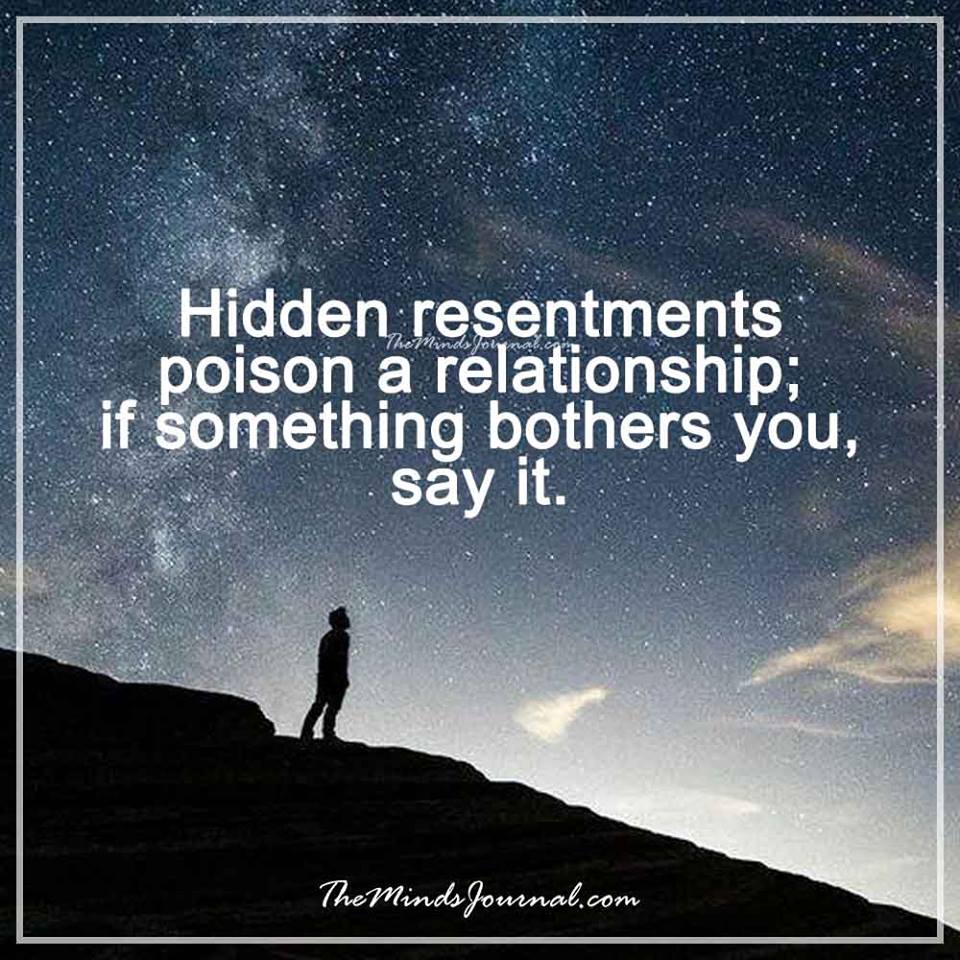Resentment in marriage can be a sneaky and toxic force that can undermine the love and trust between partners. It can grow over time, fueled by unspoken frustrations and hurt feelings, and before you know it, you’re left with a relationship that feels cold and distant.
But the good news is that resentment can be dealt with and overcome with a little bit of effort, understanding and mutual respect.
Related: Relationship Killers: Anger and Resentment
6 Triggers Of Toxic Resentment In Relationships
1. Unresolved conflicts.
When arguments and disputes go unresolved, they can build up feelings of resentment, and the more you suppress your feelings and thoughts, the more it festers within you. This ultimately leads to a huge emotional outburst which threatens to ruin the relationship.

2. Lack of communication.
If you don’t talk openly and honestly with each other, gradually misunderstandings will start to crop up ultimately leading to resentment and a whole lot of bitterness.
3. Different priorities and values.
When both of you have different priorities and values, you tend to clash with one another frequently. This leads to constant conflict, anger, and ultimately to resentment.
4. Unfair distribution of labor.
One of the crucial causes of resentment in marriage is the unfair division of labor. If one partner feels like they are shouldering the majority of the work, it can cause feelings of resentment. If you don’t work as a team and support each other, your marriage slowly starts to crumble.
Related: Signs You’re in a Loveless Marriage (And How to Cope with It)
5. Unmet needs.
When partners have different needs, and one or both feel like their needs are not being met, it can lead to resentment. Not being on the same page when it comes to your needs and desires can cause major cracks in your marriage.
6. Infidelity.
Infidelity can lead to resentment in a marriage because it breaks the trust and emotional connection between partners. The partner who was cheated on may feel betrayed, hurt, and angry, which can lead to a build-up of resentment towards their partner.

9 Red Flags of Resentment in Marriage
Here are nine signs that resentment may be lurking in your marriage and what you can do to overcome it.
1. You avoid speaking to your spouse most of the time.
When you’re feeling resentful, you may find yourself avoiding conversations or resorting to passive-aggressive behavior to communicate your frustrations to your partner.
Study shows, that avoiding communication only perpetuates the problem more and can lead to even deeper resentment. Here, open and honest communication is key to overcoming resentment in marriage.
Moreover, it’s important to reflect on why this is happening and take steps to address the underlying issues. This may involve learning how to effectively communicate your feelings without letting anger or contempt get in the way and also trying to understand how your spouse feels and what you can do to make each other feel better.
2. You constantly pick on your spouse.
Are you feeling resentful about something specific? Are you projecting your own insecurities onto your partner?
Whether it’s complaining about your partner’s behavior or pointing out their flaws, this constant negativity can create a toxic atmosphere in your relationship.
This constant criticism can be hurtful and make your partner feel like they can never live up to your expectations. Additionally, it can lead to a lack of trust and communication in your marriage.
Related: How To Make An Unhappy Marriage Happy Again
3. Your efforts go unnoticed and unappreciated.
If you feel like your partner doesn’t appreciate or value the sacrifices you make in the relationship, it can lead to feelings of toxic resentment in marriage.
This can be especially damaging if it has been going on for a long time. It can also lead to a sense of disillusionment and a breakdown in the trust and love that form the foundation of a strong marriage.
In this case, have an open and honest conversation with your partner about how you’re feeling. Moreover, exploring ways to boost your self-worth and find fulfillment outside of your relationship can also be helpful.
4. You feel like you are walking on eggshells.
When you’re constantly worried about what will set your partner off, it’s a sign that resentment and even fear may be present. This kind of tension can be incredibly draining and make it hard to enjoy your relationship and maintain its sanctity.
Feeling like you’re walking on eggshells is one of the common signs of resentment in marriage. It can stem from feeling like your partner is overly critical or easily angered and create a sense of tension and anxiety between the two of you.
5. You feel like you are carrying the relationship on your shoulders.
When you feel like your partner is not putting in enough effort like you are, it can be easy to feel like you are being taken advantage of, leading to resentment in the relationship.
When we feel like we’re doing everything, it’s easy to start feeling like our efforts and contributions aren’t valued or appreciated. This can result in a breakdown in trust and love in the relationship.
Hence, it’s important to talk to your partner about it and work together and find a more equitable balance and responsibilities. Letting the other person do everything is not the right way to go when it comes to having a healthy relationship.
6. You always compare your relationship with others.
When you start comparing your relationship to others, it’s a sign that you’re feeling unfulfilled. Whether it’s because you see other couples who seem happier or more in love, these comparisons can lead to resentment in a marriage.
This, in turn, can result in feelings of inadequacy and low self-esteem. Additionally, it can create unrealistic expectations and lead to disappointment and frustration.
In such a scenario, instead of comparing, try to appreciate what you and your spouse have together and work together to build a strong and loving relationship.
Related: 7 Ways Forgiveness Can Transform Your Marriage
7. You are always angry with each other.
Is it a specific issue or situation that makes you angry, or is it a more general feeling of frustration and resentment?
Being constantly angry is another common sign of toxic resentment in a marriage. This anger can be directed towards your partner or just a general feeling of frustration with the relationship.
Moreover, it can manifest as verbal or physical outbursts, or as more passive-aggressive behaviors like sulking or withdrawing from the relationship. In such cases take a step back and consider what might be fueling these emotions.
8. You don’t feel emotional and physical intimacy anymore.
Resentment can be a real intimacy killer. When you’re feeling distant from your partner, it can be difficult to connect on an emotional or physical level.
The loss of intimacy is a common sign of contempt and resentment in marriage. This can manifest as a lack of physical or emotional closeness and can make you feel like you’re drifting apart from your partner.
9. You don’t feel happy with them anymore.
Whether you’re feeling unhappy with your partner or just the relationship in general, this unhappiness can be a sign that resentment is present.
This can stem from a variety of sources, such as feeling taken for granted or feeling like you’re doing everything on your own. Feeling alone and unhappy in your marriage is a major red flag when it comes to anger and resentment in marriage.
If you’re feeling unhappy in your marriage, it’s important to address the root cause of the resentment and work to overcome it together.
Related: 6 Most Common Enemies of Intimacy In A Relationship
Approaches For Overcoming Resentment In Marriage
Now that you are aware of the signs, what can you do to overcome resentment in your marriage? Here are some useful tips.
1. Communication is the key to resolving resentment.
Open and honest communication is the key to dealing with resentment in marriage. When you talk to your partner about what’s bothering you, you give them the opportunity to understand and respond to your needs and opinions. Speaking openly with one another can help you tremendously when it comes to resolving issues.
2. Give the effort to see things from your spouse’s perspective.
Try to put yourself in your spouse’s shoes. Understanding where they’re coming from can help you find common ground and work towards a solution together. Being empathetic towards each other is one of the best things you can do for one another.
3. Focus on your own personal growth.
Resentment is often the result of unmet needs and expectations. Understanding your needs and learning how to meet them will help you figure out how to let go of resentment in marriage. Focusing on self-development and self-awareness can go a long way toward being happy in life and in your marriage.
4. Go for therapy if needed.
If resentment is causing serious problems in your relationship, seeking professional help can be incredibly valuable. With the help of a therapist, you will learn to understand and address the underlying issues and how to deal with resentment in marriage.
Related: 8 Strategies to Work Through Anger and Resentment
Resentment in marriage is a complex and challenging issue, but it’s also something that can be dealt with. When you recognize the signs of resentment in your relationship, you’re taking the first step toward healing and growth.
Remember, a healthy and happy marriage takes effort and commitment from both partners, and addressing toxic resentment is an important step toward building a stronger and more fulfilling relationship.
Want to know more about the warning signs of resentment in marriage? Check this video out below!
Why do wives resent their husbands?
Wives may resent their husbands for various reasons such as lack of communication, feeling unappreciated, unequal distribution of household tasks, and infidelity. Understanding what is resentment in marriage and addressing these issues can help mitigate feelings of resentment.
What is toxic marriage?
A toxic marriage is a relationship characterized by negative patterns of behavior and harmful actions between partners. It is characterized by a lack of mutual respect, trust, and communication leading to feelings of anger, frustration, and resentment.
Can you have resentment towards your parents?
Yes, it is possible to have resentment towards your parents. Resentment in any relationship can occur when one feels mistreated, disregarded, or frustrated with the behavior of another person.











Leave a Reply